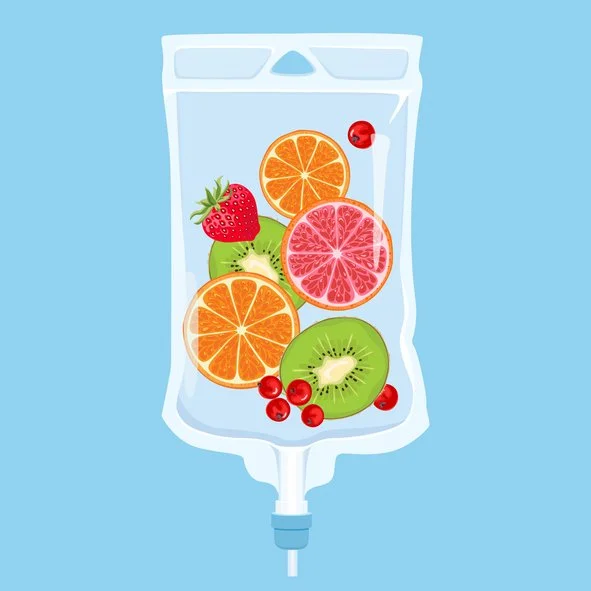How Your Body Actually Heals (Part 2)
Vitamins, Minerals, and Supplements: What Your Body Actually Needs
(Part 2 of a 4-Part Series on Cellular Health and Nervous System Regulation
By: Joy Stephenson-Laws, Holistic Coach, J.D., Founder
Catch up on the series:
Part 1: The Foundation Most People Get Wrong — Why nervous system regulation, sleep, hydration, nutrition, movement, and stress management come first
Walk into any supplement store and you'll be overwhelmed. Rows and rows of bottles. Vitamins, minerals, amino acids, herbs, probiotics, adaptogens. Each one promising to boost your energy, fix your gut, clear your brain fog, or help you sleep better.
The supplement industry is worth billions of dollars. And most people buying these products don't actually understand what supplements do — or whether they even need them.
Here's what usually happens: someone feels tired, stressed, or sick. They Google their symptoms. They see an ad or an influencer post. They buy a supplement hoping it will fix the problem. Sometimes they feel a little better. Often they don't. Either way, they're left confused about whether supplements actually work.
So let's clear this up.
In Part 1, we talked about foundation — the non-negotiable basics your body needs to function. In Part 3, we'll talk about peptides — the signaling molecules that tell your cells what to do. But right now, in Part 2, we need to talk about the middle layer: the building blocks.
Supplements are raw materials and fuel. They're the lumber, nails, and gasoline your body needs to build, repair, and run itself. They don't "fix" anything on their own. But when your body doesn't have enough of these materials, nothing works properly — no matter how good your foundation is.
Let's break down what supplements actually are, when you need them, and how to avoid wasting money on things that won't help.
What Supplements Actually Are (And What They're Not)
Here's the most important thing to understand: supplements don't do the work. They provide what your cells need to do the work.
Think of it this way. If your body is a construction site, supplements are the supplies. They're the concrete, the lumber, the wiring, the tools. Without these materials, your crew can't build anything. But having a warehouse full of supplies doesn't mean the house gets built automatically. You still need workers (your cells), instructions (we'll talk about peptides in Part 3), and a solid foundation (Part 1).
Supplements include:
Vitamins — Organic compounds your body needs in small amounts to function. They help with energy production, immune function, bone health, blood clotting, and more. Some vitamins you can make (like vitamin D from sunlight), but most you have to get from food or supplements.
Minerals — Inorganic elements like calcium, magnesium, zinc, iron, and selenium. Your body uses minerals as structural components (calcium builds bones) and as cofactors that help enzymes work (magnesium is involved in over 300 biochemical reactions).
Amino Acids — The building blocks of protein. Your body uses amino acids to build and repair tissues, make enzymes and hormones, support your immune system, and create neurotransmitters (the brain chemicals that affect your mood).
Fatty Acids — Essential fats like omega-3s that your body can't make on its own. You need them for brain function, hormone production, inflammation control, and cell membrane structure.
Herbal Supplements — Plant-based compounds that can support various functions, from reducing inflammation to supporting sleep to balancing hormones.
Probiotics — Beneficial bacteria that support gut health, immune function, and even mental health through the gut-brain connection.
All of these are raw materials. Your body takes them and uses them to build proteins, produce energy, fight off infections, repair damaged tissue, make hormones, and keep every system running.
But here's the key: supplements can only work if your foundation is solid.
If your nervous system is dysregulated, your digestion is compromised. If you're chronically stressed, you're burning through nutrients faster than you can replace them. If you're not sleeping, your body can't use the materials you're giving it to actually repair anything.
This is why Part 1 matters so much. You can't supplement your way out of a broken foundation.
Why You Might Need Supplements (Even If You Eat Well)
"But I eat healthy. Shouldn't I be getting everything I need from food?"
That's a fair question. And in an ideal world, yes. Food should provide everything your body needs.
But we don't live in an ideal world.
Here's why even people who eat well often need targeted supplementation:
1. Our Soil Is Depleted
Modern industrial farming has stripped minerals from the soil. Studies show that vegetables grown today have significantly fewer vitamins and minerals than the same vegetables grown 50 years ago. You can eat a perfect salad and still be deficient in key nutrients because the food itself doesn't contain what it used to.
2. Stress Depletes Nutrients Fast
Chronic stress burns through magnesium, B vitamins, and vitamin C at an accelerated rate. Your body uses these nutrients to produce stress hormones and manage the physiological effects of being in fight-or-flight mode. If you're chronically stressed (and most people are), you're depleting your reserves faster than food can replace them.
3. Gut Damage Prevents Absorption
If your gut lining is damaged from stress, medications, processed foods, or trauma (remember Part 1 — you can't heal your gut without healing your nervous system), you're not absorbing the nutrients from your food properly. You could be eating all the right things and still be deficient because your digestive system can't extract and absorb what you need.
4. Medications Block Nutrient Absorption
Many common medications interfere with nutrient absorption or deplete specific vitamins and minerals. Birth control pills deplete B vitamins, folate, magnesium, and zinc. Proton pump inhibitors (PPIs for acid reflux) block the absorption of magnesium, calcium, iron, and vitamin B12. Statins deplete CoQ10. Metformin depletes B12. If you're on medication long-term, you may need to supplement to compensate for what the medication is taking away.
5. Aging Changes Everything
As you age, your body produces less stomach acid, fewer digestive enzymes, and your cells become less efficient at absorbing and using nutrients. You also naturally produce fewer signaling molecules (we'll talk about peptides in Part 3). This means older adults often need higher amounts of certain nutrients just to maintain the same level of function they had when they were younger.
6. Certain Life Stages Require More
Pregnancy, breastfeeding, athletic training, recovery from illness or surgery, menopause — all of these increase your body's demand for specific nutrients. Food alone may not provide enough during these high-demand periods.
7. Some Nutrients Are Hard to Get from Food
Vitamin D is hard to get in adequate amounts from food alone, especially if you live in a northern climate or spend most of your time indoors. Omega-3 fatty acids (EPA and DHA) are primarily found in fatty fish, and most people don't eat enough fish to meet their needs. Certain forms of magnesium are more bioavailable in supplement form than in food.
So yes, food should be your primary source of nutrients. But targeted supplementation often fills real gaps that food can't cover — especially in our modern world.
The Connection You're Missing: Stress Destroys Nutrient Absorption
Here's something most people don't realize, and it connects directly back to Part 1:
When you're stressed, anxious, or operating from unresolved trauma, your body cannot absorb nutrients properly.
Remember the two nervous system modes? Fight-or-flight shuts down digestion. Your body diverts blood flow away from your digestive organs and toward your muscles. It produces less stomach acid. It secretes fewer digestive enzymes. Your gut motility slows down.
Think about the last time you ate while anxious — maybe before a big presentation, during an argument, or right after receiving bad news. Did that food sit like a rock in your stomach? Did you feel nauseated or bloated? That's not in your head. That's your nervous system literally shutting down digestion in real time.
This isn't just theory. Researchers have measured this. When study participants were shown stressful images or asked to perform anxiety-inducing tasks, their digestive function measurably declined within minutes. Stomach acid production dropped. Enzyme secretion decreased. Gut motility slowed.
That expensive probiotic or multivitamin you're taking? If you're chronically stressed, your body can't absorb it properly.
This is why nervous system regulation isn't some fluffy wellness concept. It's biochemistry. When you use tools like Feel-Pause-Act (from Part 1), when you work through trauma, when you practice breathwork or engage in therapy, you're literally improving your gut's ability to extract and absorb nutrients from food and supplements.
You can take the highest-quality supplements in the world, but if your nervous system is stuck in threat mode, you're getting a fraction of the benefit.
What Your Body Actually Needs: The Essential Nutrients
Let's talk about what nutrients actually do in your body. Not vague promises like "boosts energy" or "supports immunity." Real, specific functions.
I'm going to organize this by what these nutrients do for you, because that's more useful than just memorizing a list.
The Energy and Mood Team: B Vitamins and Iron
Ever wonder why you can sleep eight hours and still wake up exhausted? Or why your brain feels foggy by 2 p.m.? Often, it comes down to energy production at the cellular level.
B vitamins (B1, B2, B3, B5, B6, B7, B9, B12) are your body's energy converters. They take the food you eat and turn it into usable fuel. But they also do something equally important: they help your body make neurotransmitters — the brain chemicals that affect your mood, focus, and stress response.
When you're deficient, you feel it everywhere. Chronic fatigue that doesn't improve with rest. Brain fog. Irritability. Depression. Anxiety. Poor memory. Some people get tingling in their hands or feet, especially with B12 deficiency.
Why is deficiency so common? Stress depletes B vitamins rapidly — you're literally burning through them to manage the stress response. Vegans and vegetarians are at risk for B12 deficiency because it's primarily found in animal products. Birth control pills, PPIs, and metformin all block absorption. And if your gut is damaged, you can't absorb them properly even if you're eating enough.
Iron works with B vitamins to power your energy production. Iron makes hemoglobin, the protein in red blood cells that carries oxygen throughout your body. Without enough iron, your cells can't get the oxygen they need to produce energy. You feel exhausted, weak, short of breath. Your skin looks pale. Your hands and feet are always cold. You get dizzy easily. Your nails become brittle. You get sick more often because your immune system needs iron to function.
Women who menstruate lose iron every month. Vegetarians and vegans may not get enough bioavailable iron (the form in meat absorbs much better than plant sources). Gut issues prevent absorption. Some people have genetic conditions that affect how their bodies handle iron.
The energy and mood team work together. When they're depleted, everything feels harder.
The Relaxation and Recovery Crew: Magnesium and Vitamin C
Now let's talk about the nutrients that help your body calm down, recover, and repair.
Magnesium is involved in over 300 biochemical reactions in your body. It's the relaxation mineral. It helps your muscles relax (which is why deficiency causes cramps and twitches). It calms your nervous system (which is why deficiency makes anxiety worse). It helps you sleep (which is why so many people with insomnia are magnesium deficient). It supports energy production, blood sugar regulation, and heart rhythm.
When you're deficient, your body stays tense. Muscle cramps or twitches. Anxiety that won't settle. Insomnia or restless sleep. Constipation. Headaches. Heart palpitations. Fatigue even though you're wired. Irritability.
Stress depletes magnesium faster than almost any other nutrient. Most people don't eat enough magnesium-rich foods (leafy greens, nuts, seeds, whole grains). Soil depletion means even these foods have less magnesium than they used to. Alcohol, caffeine, and sugar all increase magnesium loss through your urine.
Vitamin C does double duty. It's a powerful antioxidant that protects your cells from damage caused by stress and inflammation. But it's also required for making collagen — the protein that keeps your skin firm, your joints flexible, and your blood vessels strong. Without enough vitamin C, wounds heal slowly. Your gums bleed. You bruise easily. Your skin gets dry. Your joints hurt. You get sick more often because your immune system needs vitamin C to function. And here's the thing: stress burns through vitamin C incredibly fast.
Your body can't store vitamin C, so you need it every day. Smokers need significantly more. And if you're under chronic stress, you're depleting it constantly.
The relaxation and recovery crew help your body shift out of fight-or-flight and into repair mode. Without them, you're stuck in a tense, inflamed state.
The Inflammation Fighters: Omega-3s and Vitamin D
Chronic inflammation is at the root of most modern diseases. Heart disease, diabetes, autoimmune conditions, depression, Alzheimer's, chronic pain — all linked to inflammation that won't resolve.
Omega-3 fatty acids (EPA and DHA) are your body's natural anti-inflammatory agents. They reduce inflammation throughout your entire system. They support brain function (your brain is about 60% fat and needs omega-3s to work properly). They stabilize mood. They protect heart health. They support healthy skin and joints.
When you're deficient, inflammation runs unchecked. Your skin gets dry. Your hair becomes brittle. Your joints ache. Your brain feels foggy. You struggle with depression or mood swings. Your memory isn't what it used to be. You get sick more often.
Most people don't eat fatty fish (salmon, sardines, mackerel) regularly enough. Plant-based omega-3s from flax, chia, and walnuts don't convert well to the forms your body actually needs (EPA and DHA). So even if you're eating plant sources, you might still be deficient in what matters most.
Vitamin D is technically a hormone, not just a vitamin. It regulates hundreds of genes. It's critical for immune function, bone health, mood regulation, and inflammation control. Low vitamin D is linked to depression, autoimmune diseases, frequent infections, chronic pain, and increased risk of serious illness.
When you're deficient, you get sick all the time. You feel fatigued even with adequate sleep. Your bones or back hurt. You feel depressed, especially in winter. Wounds heal slowly. Your hair falls out. Your muscles ache.
Unless you spend significant time in direct sunlight without sunscreen (which blocks vitamin D production), you're probably not making enough. Very few foods contain adequate vitamin D. Most people need to supplement, especially in winter or if they live in northern climates.
The inflammation fighters keep your body from destroying itself with chronic, low-grade inflammation that accelerates aging and disease.
The Immune and Repair Specialists: Zinc and the Whole Team Working Together
Zinc is the multitasker. It supports immune function, wound healing, DNA synthesis, cell division, and protein production. It's critical for your sense of taste and smell (which is why COVID patients who lost taste and smell often had zinc deficiency). It helps regulate inflammation and supports skin health.
When you're deficient, you get sick constantly. Cuts and scrapes take forever to heal. Your hair falls out. You have chronic diarrhea. You lose your sense of taste or smell. Your skin breaks out or won't clear up. Your appetite disappears. Your mood tanks.
Stress increases zinc loss. Vegetarians and vegans are at higher risk because plant sources don't absorb as well as animal sources. Soil depletion reduces zinc in foods. Birth control pills and certain medications deplete it. Gut issues prevent absorption.
Here's what's important to understand: all of these nutrients work together. They're not solo acts.
Vitamin C helps you absorb iron. Vitamin D needs magnesium to work properly. B vitamins and iron work together for energy. Zinc supports immune function, but so do vitamins C and D and omega-3s. Magnesium is involved in over 300 reactions, which means it touches almost everything else.
This is why taking one supplement in isolation often doesn't work. Your body needs the whole team, working together, with a solid foundation (Part 1) that allows absorption in the first place.
When Oral Supplements Aren't Enough: The IV Question
Sometimes oral supplementation doesn't work well enough. That's when IV (intravenous) therapy makes sense.
Here's the difference:
Oral supplements have to go through your digestive system. They get broken down by stomach acid and enzymes, absorbed through your intestinal wall (if your gut is healthy enough), filtered through your liver, and then distributed to your cells. Depending on the nutrient and the health of your gut, you might absorb anywhere from 10% to 80% of what you take.
IV supplements bypass your digestive system entirely. They go straight into your bloodstream, which means 100% absorption. Your cells get immediate access to the nutrients.
When IV Makes Sense:
Your gut is severely damaged and you can't absorb oral supplements
You're dealing with severe deficiency and need to restore levels quickly
You're recovering from illness, surgery, or intense physical stress
You have chronic conditions that prevent absorption (Crohn's, celiac, chronic diarrhea)
You need higher doses than oral supplements can safely provide
When Oral Is Fine:
Your gut is relatively healthy
You're maintaining levels, not correcting severe deficiency
You're consistent with supplementation
You're working on foundation issues (nervous system regulation, stress management) that improve absorption over time
Important considerations: IV therapy should be done under medical supervision with proper labs to guide dosing. It's more expensive than oral supplementation (often $100-300 per session). It requires time and access to a qualified provider. And just because something goes directly into your bloodstream doesn't automatically make it better or necessary. Some nutrients can be toxic in high doses, and IV delivery increases that risk if not done properly.
For most people, high-quality oral supplements combined with foundation work (improving gut health and nervous system regulation) are sufficient. IV therapy is a tool for specific situations, not a replacement for doing the basic work.
The Amino Acid → Protein Connection (Setting Up Part 3)
Let's talk about amino acids for a minute, because this sets up what we'll cover in Part 3 about peptides.
Amino acids are the building blocks your body uses to make protein. There are 20 amino acids total. Your body can make 11 of them on its own. The other 9 are called "essential amino acids" — you have to get them from food.
When you eat protein (meat, fish, eggs, beans, nuts), your digestive system breaks it down into individual amino acids. Then your cells reassemble those amino acids into whatever proteins your body needs at that moment: a muscle fiber, an enzyme to digest food, an antibody to fight infection, a hormone to regulate blood sugar, collagen to repair your skin, a neurotransmitter to affect your mood.
Here's where it gets important for understanding peptides:
Individual amino acids → short chains of amino acids (peptides) → long chains of amino acids (proteins)
Peptides sit right in the middle. They're bigger than individual amino acids but smaller than full proteins. And they do something unique: they act as messengers. They tell your cells what to do.
Your body naturally makes peptides during digestion (when breaking down proteins into smaller pieces) and also creates specific peptides on purpose to send targeted signals: "Build collagen here." "Grow new blood vessels to this injured tissue." "Activate the immune system." "Burn fat for energy."
In Part 3, we'll dive deep into how peptides work, why your body makes fewer as you age, and why therapeutic peptides are becoming one of the most important tools in modern medicine. But for now, just understand this: amino acids from supplements give your body the raw materials. Peptides (which we'll cover next) give your body the instructions.
You need both. Raw materials without instructions means your body has supplies but doesn't know what to build. Instructions without raw materials means your body gets the message but has nothing to work with.
Think of it like having a recipe (peptides) and ingredients (amino acids and other nutrients). You need both to make the meal.
The Supplement Industry: Red Flags and How to Protect Yourself
The supplement industry is largely unregulated. That creates serious risks.
What You Need to Watch Out For:
Contamination and mislabeling. Studies have found that many supplements don't contain what the label says. Some have far less of the active ingredient than claimed. Some contain contaminants like heavy metals, pesticides, or harmful bacteria. Some contain ingredients not listed on the label at all.
Outrageous claims. If a supplement promises to "cure" a disease, "reverse aging," or "detox your liver," walk away. Real supplements support function. They don't perform miracles.
Proprietary blends. When a label says "proprietary blend" without listing the actual amounts of each ingredient, you have no idea what you're getting or whether it's an effective dose.
MLM (multi-level marketing) companies. Many supplement companies operate through MLM structures where untrained salespeople push products with exaggerated claims and no medical oversight. Be skeptical.
Influencer marketing. Just because someone with a million followers promotes a supplement doesn't mean it's safe, effective, or right for you. Most influencers have zero medical training and are being paid to sell.
How to Protect Yourself:
Work with a qualified healthcare provider. A doctor, naturopath, or functional medicine practitioner should evaluate your symptoms, order appropriate lab work, and recommend supplements based on your actual needs — not guesses or trends.
Look for third-party testing. Choose supplements that have been tested by independent organizations like NSF, USP, or ConsumerLab. These certifications verify that the product contains what the label says and is free from contaminants.
Check for transparency. Reputable companies list all ingredients and amounts clearly. They provide information about sourcing and manufacturing standards. They have accessible customer service.
Start with food first. Supplements should supplement a good diet, not replace it. Focus on nutrient-dense whole foods as your foundation, and use supplements to fill specific gaps.
Be patient. Supplements aren't drugs. They work gradually by providing what your body needs to function properly. If someone promises instant results, be skeptical.
How to Know What YOU Actually Need
Don't guess. Don't follow trends. Don't buy whatever your favorite influencer is selling.
Here's how to figure out what you actually need:
1. Pay Attention to Your Symptoms
Chronic fatigue, brain fog, mood issues, hair loss, brittle nails, frequent infections, slow healing, digestive problems, muscle cramps, sleep issues — these are your body's way of telling you something is off. Symptoms often point to specific deficiencies.
2. Get Lab Work
A good healthcare provider will order blood tests to check your levels of key nutrients: vitamin D, B12, iron, ferritin (stored iron), magnesium (though blood tests don't always reflect cellular levels), and others based on your symptoms. Labs give you objective data instead of guesses.
3. Consider Your Risk Factors
Are you under chronic stress? On medications that deplete nutrients? Vegetarian or vegan? Dealing with gut issues? Pregnant or breastfeeding? Going through menopause? Athletic? These factors help identify where you're most likely to have deficiencies.
4. Work with Someone Who Understands the Whole Picture
The best providers don't just throw supplements at symptoms. They look at foundation (Part 1), building blocks (Part 2), and signaling (Part 3). They understand that nervous system dysregulation affects absorption. They address root causes, not just band-aid solutions.
How Supplements Fit Into the Holistic Picture
Let's bring this full circle.
In Part 1, we talked about foundation: nervous system regulation, sleep, hydration, whole food nutrition, movement, and stress management. These are non-negotiable. Without them, nothing else works.
In this part, we've talked about building blocks: vitamins, minerals, amino acids, and other raw materials your body needs to function. When food can't provide enough (due to soil depletion, stress, gut damage, medications, or increased demand), supplements fill real gaps.
In Part 3, we'll talk about signaling: peptides that tell your cells what to do with those building blocks.
And in Part 4, we'll tie it all together: why emotional safety and nervous system regulation make everything else actually work.
Here's the hierarchy:
Foundation (Part 1) → creates the environment where healing can happen
Building blocks (Part 2) → provide the raw materials your body needs
Signaling (Part 3) → give your cells instructions on what to build
Safety (Part 4) → makes your body receptive to all of it
You can't skip steps. You can't peptide your way out of a broken foundation. You can't supplement your way out of chronic stress and trauma. But when you address all four layers, that's when real, lasting healing becomes possible.
What's Coming in Part 3
In the next part of this series, we'll talk about peptides — the tiny molecules that are revolutionizing modern medicine.
You'll learn:
How peptides relate to the amino acids and proteins we talked about in this article
Why your body makes fewer peptides as you age, and what that means for healing
What the science actually says about therapeutic peptides for gut repair, skin health, metabolism, immune function, and brain health
Why most peptides can't be taken orally (and which ones can)
How to navigate the largely unregulated peptide industry safely
Peptides are the instructions. Supplements are the materials. Foundation is the environment. And nervous system regulation is what makes your body receptive to all of it.
What You Need to Remember
Supplements are raw materials and fuel, not magic bullets.
They provide what your cells need to build, repair, and function properly.
Even people who eat well often need targeted supplementation due to soil depletion, stress, gut damage, medications, or life stage demands.
Chronic stress and nervous system dysregulation destroy your ability to absorb nutrients — literally.
Nutrients work as teams: the energy team (B vitamins, iron), the relaxation crew (magnesium, vitamin C), the inflammation fighters (omega-3s, vitamin D), and the immune specialists (zinc).
IV therapy makes sense for severe deficiency or compromised gut absorption, but it's expensive and requires medical supervision.
The supplement industry is largely unregulated — work with qualified providers and choose third-party tested products.
Don't guess what you need. Get labs. Pay attention to symptoms. Work with someone who understands the whole picture.
Supplements work best when your foundation is solid and your nervous system is regulated.
Amino acids are the building blocks. Peptides (coming in Part 3) are the instructions.
This article is for educational purposes only and does not constitute medical advice. Always consult a qualified healthcare provider before starting any supplement regimen, especially if you're pregnant, breastfeeding, taking medications, or dealing with chronic illness.
Research References
Davis DR, et al. "Changes in USDA Food Composition Data for 43 Garden Crops, 1950 to 1999." Journal of the American College of Nutrition, 2004.
Serefko A, et al. "Magnesium in depression." Pharmacological Reports, 2013.
Konturek PC, et al. "Stress and the gut: pathophysiology, clinical consequences, diagnostic approach and treatment options." Journal of Physiology and Pharmacology, 2011.
Tardy AL, et al. "Vitamins and Minerals for Energy, Fatigue and Cognition: A Narrative Review of the Biochemical and Clinical Evidence." Nutrients, 2020.
Holick MF. "Vitamin D deficiency." New England Journal of Medicine, 2007.
Sublette ME, et al. "Meta-analysis of the effects of eicosapentaenoic acid (EPA) in clinical trials in depression." Journal of Clinical Psychiatry, 2011.
Palmery M, et al. "Oral contraceptives and changes in nutritional requirements." European Review for Medical and Pharmacological Sciences, 2013.
Gröber U, et al. "Micronutrients in Oncological Intervention." Nutrients, 2016.












